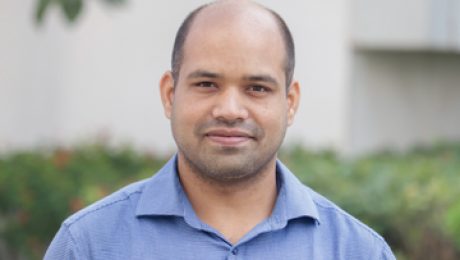Dr K Vaithianathan to delve into the need for Games & Sports
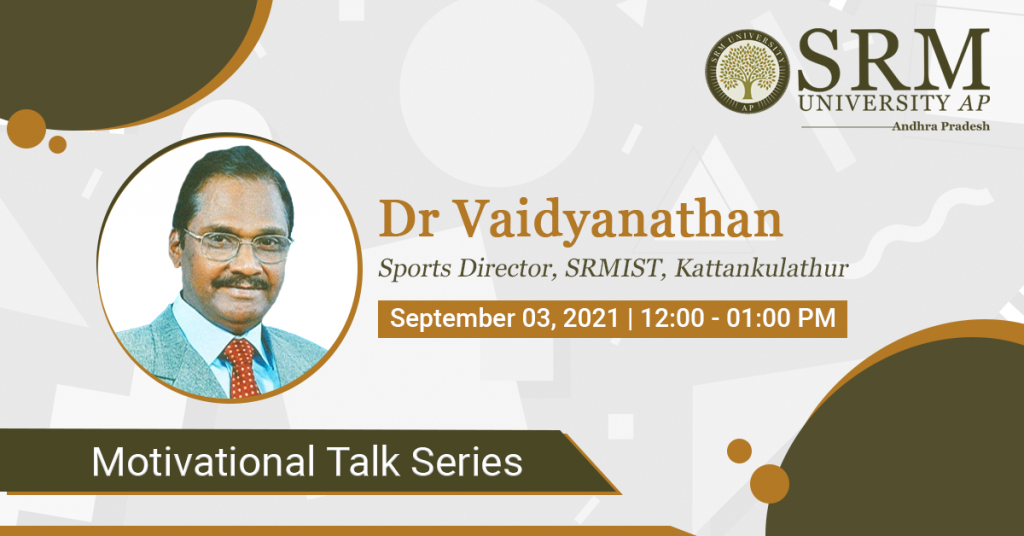 In the next chapter of Freshmen Orientation Programme-2021, SRM University-AP takes the initiative to introduce the students to the need for Sports and extracurricular activities. Dr K Vaithianathan, Director-Sports, SRM Institute of Science & Technology, Chennai, will interact with students on Friday, September 03, 2021, at 12 noon.
In the next chapter of Freshmen Orientation Programme-2021, SRM University-AP takes the initiative to introduce the students to the need for Sports and extracurricular activities. Dr K Vaithianathan, Director-Sports, SRM Institute of Science & Technology, Chennai, will interact with students on Friday, September 03, 2021, at 12 noon.
Dr K Vaithianathan has more than 47 years of experience. He did his bachelor’s and master’s in Physical Education from ACPE, Madurai University, followed by a PhD from Annamalai University. He has also done PGD-Yoga and MSc-Yoga from Annamalai University.
Dr K Vaithianathan began his career as a Physical Director in Erode Arts College. He later worked as a faculty in Alagappa College of Physical Education and Pondicherry University. He has also worked as Head, Professor and Director at Annamalai University. He also worked as the Vice-Chancellor of TamilNadu Physical Education and Sports University, Chennai. He joined SRM Institute of Science & Technology as the Director-Sports in 2013 and has brought many laurels to the institute.
As a Sports Professional, Dr K Vaithianathan has achieved many awards and recognitions. He represented Tamil Nadu State, participating in the Madurai Open National Athletic Meet in 1974. He also participated in the Palai All India Inter State Athletic Meet in 1975 and secured places at the State and National levels in High Jump & 110 M.Hurdles. Moreover, under his able guidance and mentorship, many students won medals and awards in national and international championships.
- Published in Events, Students Affairs Events
Dr A T Biju unveils the mystery of Organocatalysis
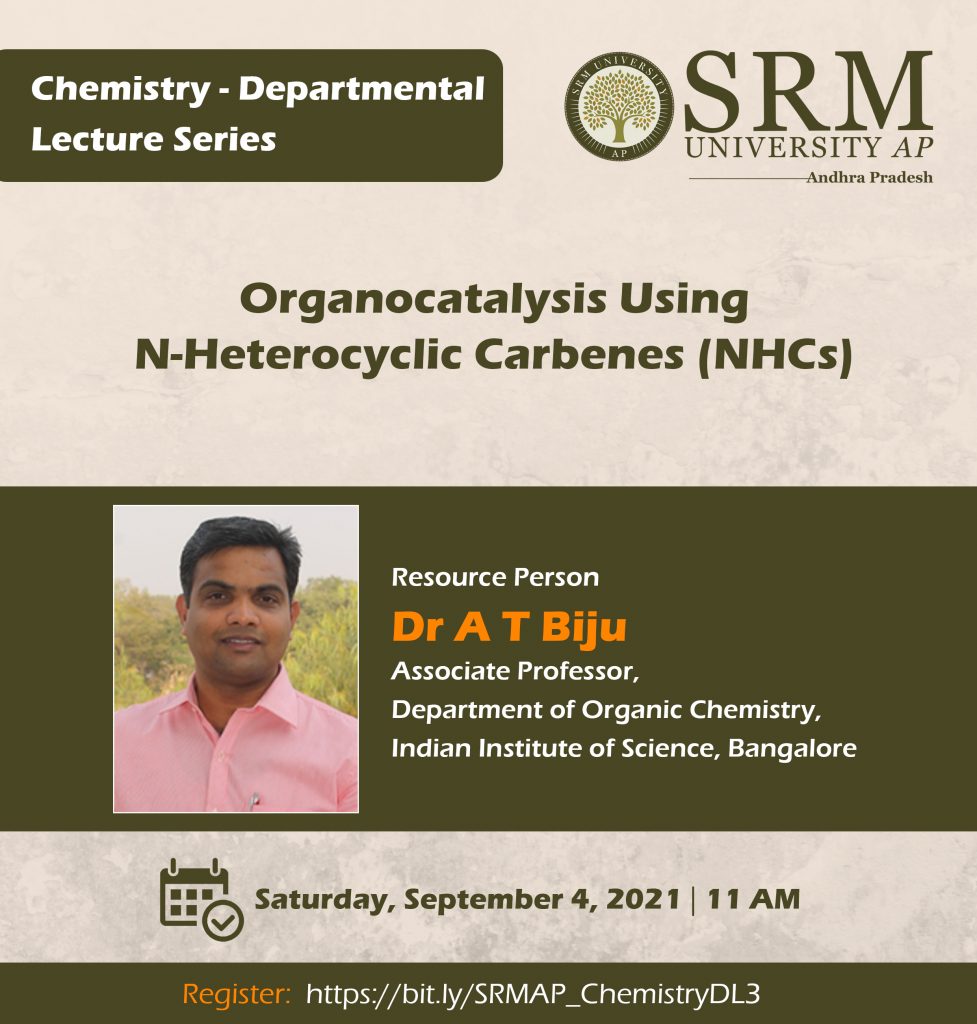 Chemistry Departmental Lecture Series brings another captivating webinar on “Organocatalysis Using N-Heterocyclic Carbenes (NHCs)”. Dr A T Biju, Associate Professor, Department of Organic Chemistry, Indian Institute of Science, Bengaluru, will deliver the keynote address on Saturday, September 04, 2021, at 11 am.
Chemistry Departmental Lecture Series brings another captivating webinar on “Organocatalysis Using N-Heterocyclic Carbenes (NHCs)”. Dr A T Biju, Associate Professor, Department of Organic Chemistry, Indian Institute of Science, Bengaluru, will deliver the keynote address on Saturday, September 04, 2021, at 11 am.
Abstract
Catalysis is a fundamentally sustainable process, which can be used to produce a wide range of chemicals and their intermediates. Among the various catalytic methods, N-heterocyclic carbene (NHC)-catalyzed umpolung of aldehydes is widely used for unconventional access to target molecules. Moreover, NHC-catalysis is known for umpolung of Michael acceptors, but imine umpolung was unknown in this realm of catalysis. In this context, Dr Biju and his team have demonstrated, for the first time, the NHC-catalyzed umpolung of imines for the synthesis of 2,3-disubstituted indoles, functionalized quinolines and dihydroquinoxalines. In addition, NHC-catalysis is widely used for the generation of α,β-unsaturated acylazoliums, followed by their interception with various nucleophiles, the formal [3+3] annulation reactions. In this area, recently Dr Biju and his team have reported the enantioselective NHC-catalyzed annulation reactions for the synthesis of dihydropyranones, dihydropyridinones, cyclopentenes, pyrazoles, spirocyclohexadienones, tricyclic δ-lactones, tetracyclic indoles etc., where NHC-bound α,β-unsaturated acylazoliums are the key intermediates. Very recently, Dr Biju employed the umpolung of aldehydes for the synthesis of axially chiral C-N bond-containing molecules. The keynote address will shed further light on this.
About the speaker
Dr A T Biju received his M Sc from Sacred Heart College Thevara (affiliated to MG University, Kerala, India) and PhD from CSIR-NIIST (Formerly RRL), Trivandrum, India. After that, he worked as a post-doctoral fellow with Prof. Tien-Yau Luh at the National Taiwan University, Taipei. He has also worked as an Alexander von Humboldt fellow with Prof. Frank Glorius at the Westfälische Wilhelms-Universität Münster, Germany. In June 2011, he began his independent research career at the CSIR-National Chemical Laboratory, Pune. He became an Associate Professor at the Department of Organic Chemistry, Indian Institute of Science, Bengaluru, in June 2017. His research focuses on the development of transition-metal-free carbon-carbon and carbon-heteroatom bond-forming reactions using aryne chemistry and N-heterocyclic carbene (NHC) organocatalysis and their application in organic synthesis.
Chemistry enthusiasts are welcomed to avail the opportunity to listen to him on Saturday, September 04, 2021, at 11 am. Register now.
- Published in Chemistry Events, Events
CRIDAP appoints Dr Ghanshyam Pandey as an expert for agriculture
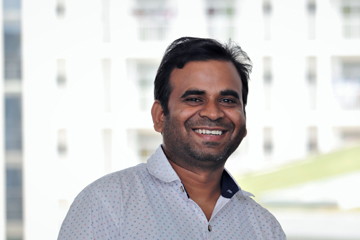 Dr Ghanshyam Pandey, Assistant Professor of Economics, SRM University – AP has been appointed as an expert for agriculture, rural development, livelihood issues, and climate change and agriculture by The Centre of Integrated Rural Development for Asia and Pacific (CRIDAP). CRIDAP is an intergovernmental and autonomous organization and has 15 member countries. The member countries are Afghanistan, Bangladesh, Fiji, India, Indonesia, Iran, Lao PDR, Malaysia, Myanmar, Nepal, Pakistan, Philippines, Sri Lanka, Thailand, and Vietnam. His tenure of appointment will be up to 2024.
Dr Ghanshyam Pandey, Assistant Professor of Economics, SRM University – AP has been appointed as an expert for agriculture, rural development, livelihood issues, and climate change and agriculture by The Centre of Integrated Rural Development for Asia and Pacific (CRIDAP). CRIDAP is an intergovernmental and autonomous organization and has 15 member countries. The member countries are Afghanistan, Bangladesh, Fiji, India, Indonesia, Iran, Lao PDR, Malaysia, Myanmar, Nepal, Pakistan, Philippines, Sri Lanka, Thailand, and Vietnam. His tenure of appointment will be up to 2024.
Dr Ghanshyam Pandey’s role in the organisation:
- CIRDAP resource person to participate in project proposal development and consultancy.
- CIRDAP resource person for flagship training courses.
- Reviewer of Asia-Pacific Journal on Rural Development (APJORD).
- Part of CIRDAP Think Tank for knowledge sharing and solutions to IRD and PA.
- To expand CIRDAP Think Tank Networks.
- To advise on refining CIRDAP Strategic Plan 2020-2024.
About the organisation:
The Centre on Integrated Rural Development for Asia and the Pacific (CIRDAP) is a regional, intergovernmental and autonomous organisation. It was established on 6 July 1979 at the initiative of the countries of the Asia-Pacific region and the Food and Agriculture Organization (FAO) of the United Nations with support from several other UN bodies and donors. The Centre came into being to meet the felt needs of the developing countries at that time as an institution for promoting integrated rural development in the region. From the original six members, CIRDAP has now grown up as a Centre of 15 member countries. The member countries are Afghanistan, Bangladesh (Host State), Fiji, India, Indonesia, Iran, Lao PDR, Malaysia, Myanmar, Nepal, Pakistan, Philippines, Sri Lanka, Thailand and Vietnam. Operating through designated contact ministries and link institutions in member countries, CIRDAP promotes regional cooperation. It plays a supplementary and reinforcing role in supporting and furthering the effectiveness of integrated rural development programmes in Asia and the Pacific.
- Published in Departmental News, Economics Current Happenings, Economics News, News, Research News
Oxford Professor elucidates on the secession with natural resources
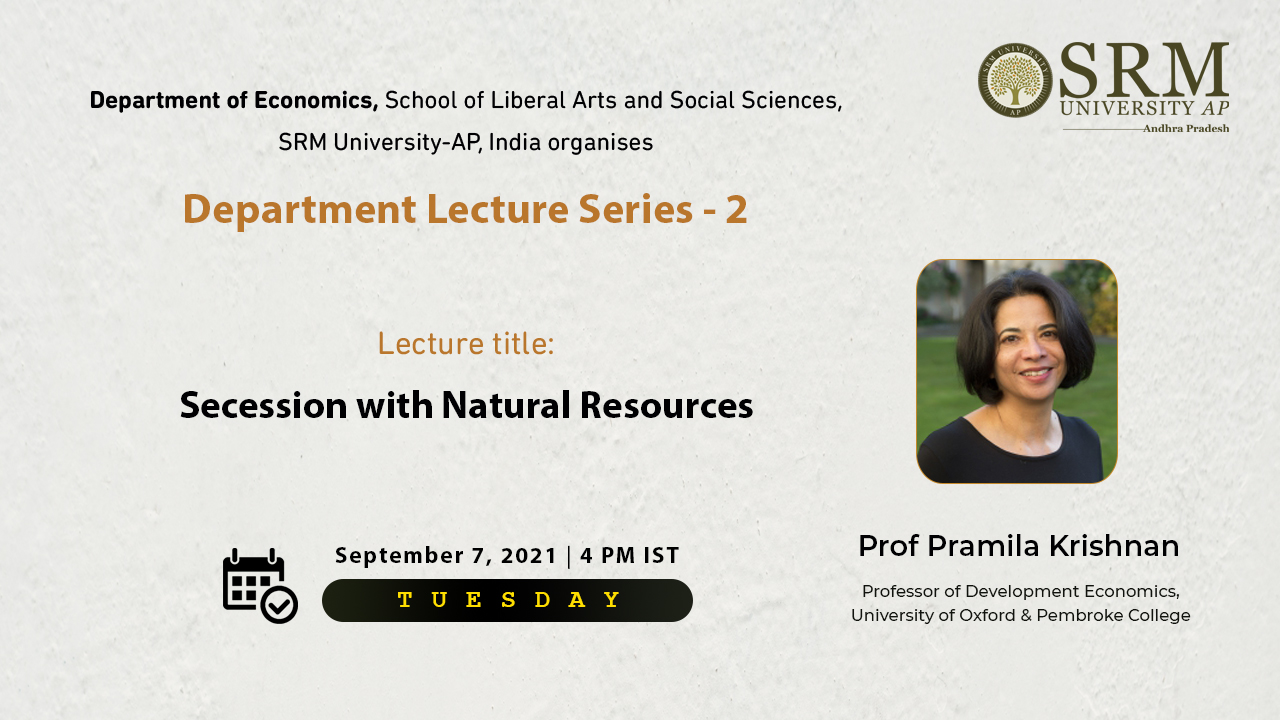 The second episode of the lecture series organised by the Department of Economics, SRM University-AP, will be held on September 07, 2021, at 04.00 pm. The lecture titled “Secession with natural resources” will be delivered by Prof Pramila Krishnan from the Oxford Department of International Development.
The second episode of the lecture series organised by the Department of Economics, SRM University-AP, will be held on September 07, 2021, at 04.00 pm. The lecture titled “Secession with natural resources” will be delivered by Prof Pramila Krishnan from the Oxford Department of International Development.
Abstract:
The lecture will look at the formation of new Indian states in 2001 to uncover the effects of political secession on the comparative economic performance of natural resource-rich and natural resource-poor areas. Resource-rich constituencies fared comparatively worse within new states that inherited a relatively larger proportion of natural resources. The study argues that these patterns reflect how political reorganization affected the quality of state governance of natural resources. Results describe a model of collusion between state politicians and resource rent recipients that can account for the relationships we see in the data between natural resource abundance and post-break-up local outcomes.
About the Speaker:
Pramila Krishnan is a Professor of Development Economics at Oxford Department of International Development, University of Oxford and a Fellow at Pembroke College, Oxford. She began her academic life as an econometrician working on models of self-selection before seeing the light and moving on to work in development economics.
Her research has concentrated on applied microeconomics and she has worked on topics ranging from household portfolios of poor households to risk-sharing, intra-household allocation and informal insurance, social networks, non-cognitive skills and whether migrants might be both rich and happy. Pramila Krishnan teaches on the MSc in Economics for Development, offering a module on education.
Join this intriguing online lecture on September 07, 2021, at 04.00 pm and enrich your knowledge through the scholarly voice of Prof Pramila Krishnan!
- Published in Departmental Events, Economics Current Happenings, Economics Events, Events
Undergraduate gets placed in Danske IT, a fully owned subsidiary of Danske Bank
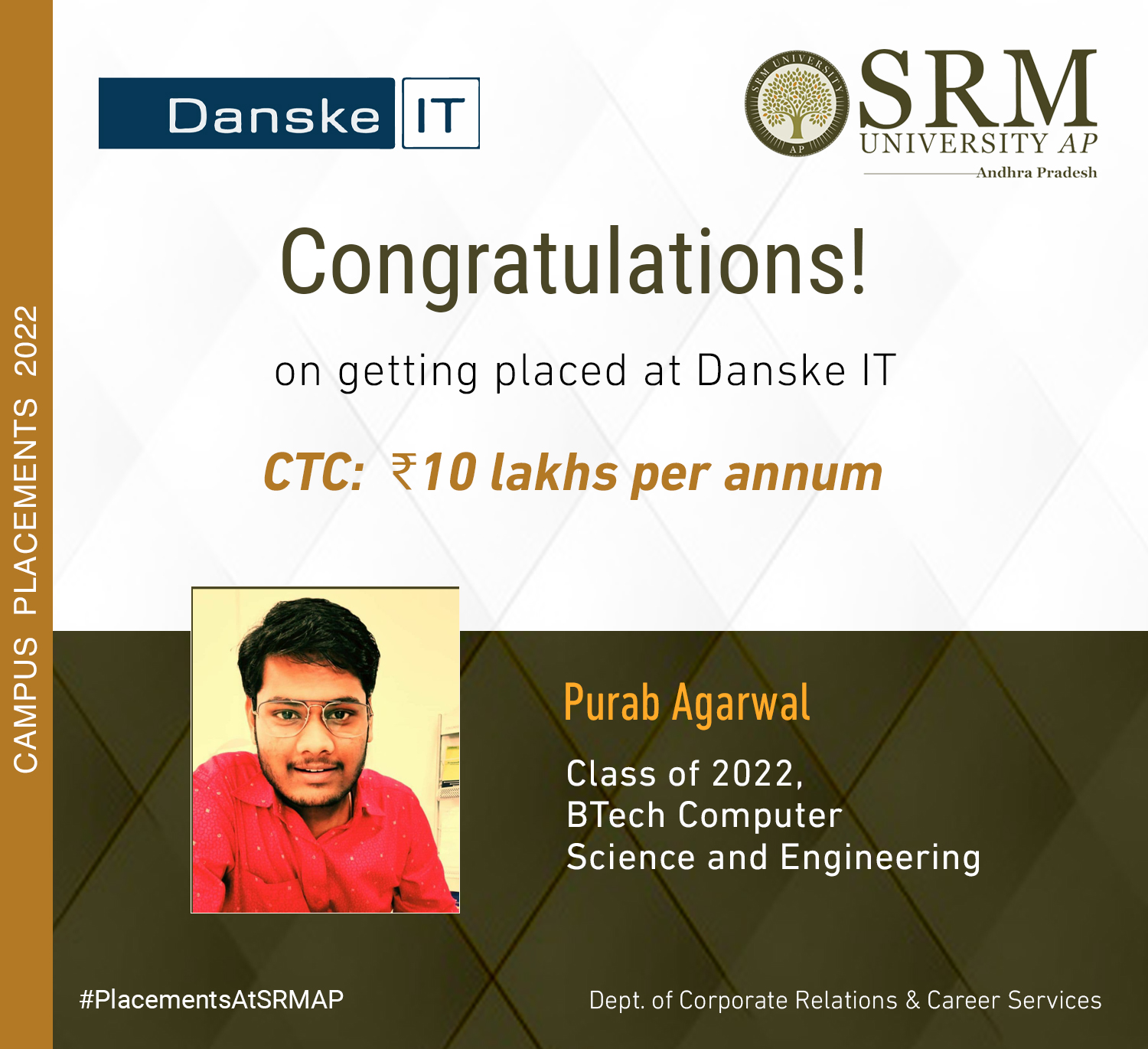 Purab Agarwal from the Department of Computer Science and Engineering has been successfully placed at Danske IT, a fully owned subsidiary of Danske Bank with an exciting CTC of 10 LPA. The company is headquartered in Bengaluru.
Purab Agarwal from the Department of Computer Science and Engineering has been successfully placed at Danske IT, a fully owned subsidiary of Danske Bank with an exciting CTC of 10 LPA. The company is headquartered in Bengaluru.
Danske IT, which has been in operation since 2015, is a fully owned subsidiary of the Danske Bank Group, Denmark’s largest bank and a leading bank in Northern Europe with a global presence. Danske IT is dedicated to providing cutting-edge, end-to-end solutions to clients by providing value through high-performing teams. They are also committed to assisting Danske Bank in realising its goal of becoming the most trusted financial partner in the world.
Purab Agarwal with overwhelming joy narrates his experience at SRM University-AP. “I was good in academics from the beginning of my degree. I believe that the curriculum helped me in enhancing my knowledge of different domains. It showed me a direction to what I need to pursue. CCC training organised by the placement cell of the university helped me a lot in my preparation. I had earlier also been shortlisted for ABInbev, Sahaj, Nielsen, and Bajaj Finserv. My advice to juniors would be to always be curious and humble.
- Published in CR&CS, CR&CS NEWS, News, Students Achievements
Dr. Kshira Sagar Sahoo
- Published in CSE Faculty, Faculty, SEAS
Insightful discussion with Mr Karl-Alexander Seidel
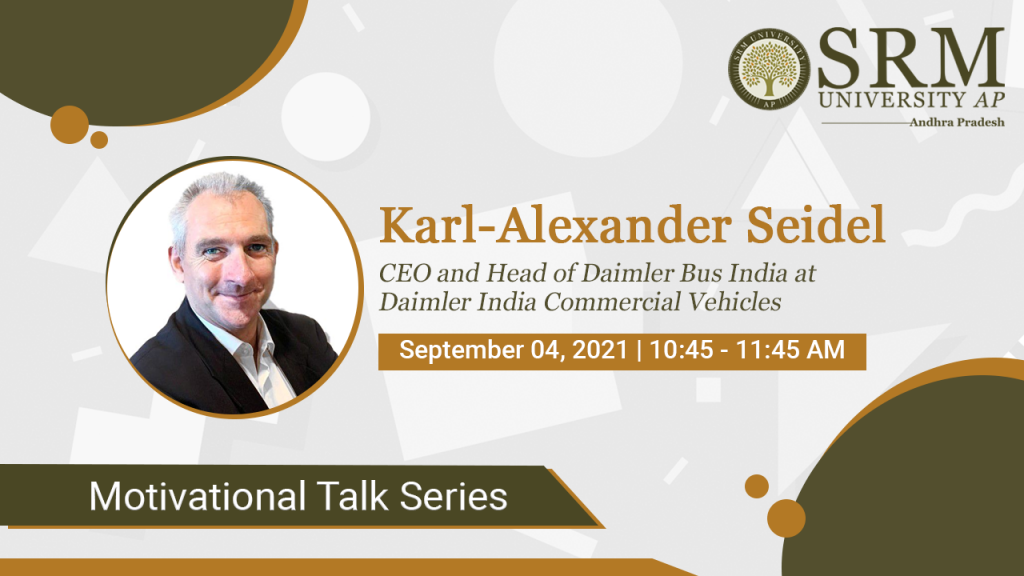 In the next chapter of Freshmen Orientation Programme-2021, a special talk will be delivered by renowned corporate mogul Mr Karl-Alexander Seidel. Mr Alex is the CEO and Head of Daimler Bus, India at Daimler India Commercial Vehicles. The talk has been scheduled for September 04, 2021, at 10.45 am and aims to provide an insight of the industry and its culture.
In the next chapter of Freshmen Orientation Programme-2021, a special talk will be delivered by renowned corporate mogul Mr Karl-Alexander Seidel. Mr Alex is the CEO and Head of Daimler Bus, India at Daimler India Commercial Vehicles. The talk has been scheduled for September 04, 2021, at 10.45 am and aims to provide an insight of the industry and its culture.
Mr Karl-Alexander Seidel started his career at Daimler in 2001. Between then and 2014, he held a variety of management functions in the fields of Reporting, Business Development, Product Planning and Homologation, mainly in Daimler’s commercial vehicles division, as well as at TASIAP GmbH in Stuttgart. Since 2014 he has been working for Daimler in India, where he was initially responsible for powertrain supplier management. Between 2016 and 2017 he was in charge of the “Logistics, Supplier & Quality Management” department at Daimler Buses in India before assuming his current function in 2017.
Mr Karl-Alexander Seidel is a highly competent commercial vehicles manager with many years of India-related experience from our bus business in Chennai. In recent years he has made a significant contribution to building up our Indian bus production activities by implementing corresponding supply and logistics flows, as well as the corresponding quality management.
- Published in Events, Students Affairs Events
Motivational session with Professor Upadrasta Ramamurty
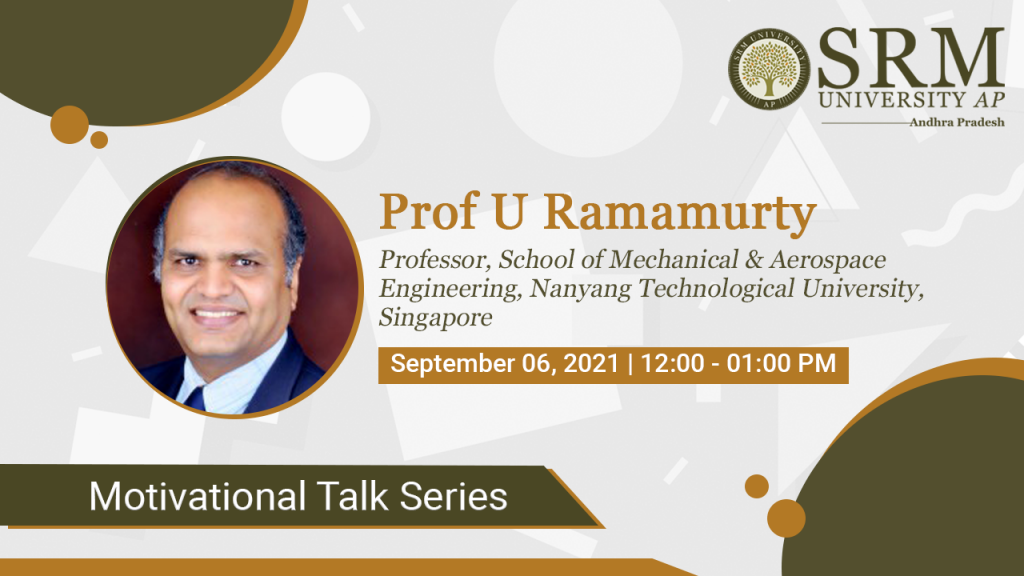 Freshmen Orientation Programme-2021 welcomes Professor Upadrasta Ramamurty, School of Mechanical & Aerospace Engineering, Nanyang Technological University, Singapore, to deliver a talk on September 06, 2021, at 12 noon.
Freshmen Orientation Programme-2021 welcomes Professor Upadrasta Ramamurty, School of Mechanical & Aerospace Engineering, Nanyang Technological University, Singapore, to deliver a talk on September 06, 2021, at 12 noon.
Professor Upadrasta Ramamurty received a Bachelor of Engineering (Metallurgy) degree from Andhra University in 1989 and a Master of Engineering (Metallurgy) degree from Indian Institute of Science in 1991, both with a Metallurgy specialisation, as well as a Doctorate of Philosophy degree in Engineering from Brown University in 1994. His postdoctoral research was carried out at the University of California-Santa Barbara and the Massachusetts Institute of Technology.
Professor Ramamurty is a widely respected researcher who has co-authored over 250 papers in peer-reviewed international journals that have been referenced over 9000 times (with a Hirsch index of 46) in both the Web of Science and Scopus databases. Several honours, including the Chinese Academy of Sciences’, the Lee Hsun Lecture Award of the Chinese Academy of Sciences, TWAS Prize (Engineering Sciences), CNR Rao Prize Lecture in Advanced Materials of Materials Research Society of India, J.C. Bose National Fellowship and Swarnajayanthi Fellowships of Government of India, Metallurgist of the Year Award by Indian Institute of Metals, and Scopus Young Scientist Award, have acknowledged his research efforts.
Professor Ramamurty is an elected fellow of the Indian National Science Academy, the Indian National Academy of Engineering, the Indian Academy of Sciences, and The World Academy of Sciences (TWAS). He held numerous distinguished/invited professor/scientist positions around the world, including the Institute of Materials Research (IMRE) in Singapore, Zhejiang University in China (Qiushi Distinguished Visiting Professor), Université de Lorraine in France (Exceptional Class Professeur invité), Jawaharlal Nehru Centre for Advanced Scientific Research in India, and the Massachusetts Institute of Technology.
Since 2014, Professor Ramamurty has served as an Editor for Acta Materialia and Scripta Materialia. Professor Ramamurty’s research focuses on addressing fundamental scientific and technological difficulties in the materials/mechanics domains, which have direct implications for advanced manufacturing as well as component structural integrity and reliability.
Professor Ramamurty made significant contributions to the understanding of the mechanical behaviour of advanced metallic alloys, composites, and molecular crystals during the course of a nearly three-decade professional career. The nature of his work is both fundamental as well as applied and hence was continuously supported by industrial giants like Boeing, General Motors and Rolls Royce.
- Published in Events, Students Affairs Events
Cost-effective electro-catalyst for oxygen reduction reaction
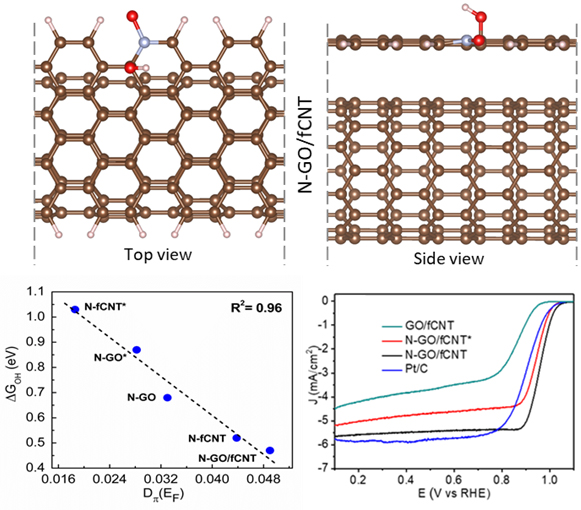 A research paper titled “Nitrogen doping derived bridging of Graphene and Carbon Nanotube composite for oxygen electroreduction” has been published by Prof Ranjit Thapa, Professor of Physics, SRM University – AP, as a co-author, in International Journal of Energy Research, having Impact Factor of 5.164.
A research paper titled “Nitrogen doping derived bridging of Graphene and Carbon Nanotube composite for oxygen electroreduction” has been published by Prof Ranjit Thapa, Professor of Physics, SRM University – AP, as a co-author, in International Journal of Energy Research, having Impact Factor of 5.164.
In this work, the research group investigated the origin of high catalytic activity of oxidic-N configuration in nitrogen-doped CNT and graphene heterostructure using density functional theory (DFT). We have plotted the free energy profile of the oxygen reduction reaction (ORR) to estimate the thermodynamic overpotential and catalytic performance of the respective active sites. The overpotential is related to the quantifying parameter ∆GOH (with R2 = 0.98) and the π electron density at the Fermi level, defined as an electronic descriptor, which is highly correlated with the ∆GOH with R2 value 0.96. For various N doped configurations, we correlated the ∆GOH values with π electron density at the Fermi level and found that the carbon site adjacent to the oxide-N configuration is a more prominent site for ORR. Further, we show that the oxidic-N configuration in the heterostructure of graphene and CNT is the ideal configuration, which gives a lower overpotential of 0.54 eV for ORR on adjacent carbon sites. Therefore, the charge transfer occurs from underneath CNT to graphene and increases the value of π electron density at the Fermi level which leads to the higher catalytic performance of the active site.
In the early 20th century, fuel cells were invented and their global impact has not reached up to its regular commercialization when compared with battery technology. The fuel cell device could be a powerful technique to generate electricity for large energy demand without greenhouse gas emissions. However, other major hurdles in the commercialization of fuel cell devices are the cost of platinum (as a catalyst), its poisoning and stability. Recently, carbon-based materials such as graphene, carbon nanotubes and activated carbon have been evolved as metal-free low-cost catalysts due to their (i) high abundance/yield (ii) reactivity towards oxygen just by introducing impurities like heteroatoms or other metals. However, identifying an efficient design principle to search optimal doping configurations in various carbon systems is a grand challenge for researchers.
This work is done in collaboration with Research Institute, SRM Institute of Science & Technology, Kattankulathur-603203, Chennai (India).
In future, the study aims to propose the effective design principle for various doped carbon systems as a catalyst to identify the optimal active sites and configurations for ORR. The role of π orbital in carbon systems such as graphene, graphene nanoribbons, carbon nanotube, etc is very important and can be a general electronic descriptor to define catalytic activity. Also, π electron descriptors and machine learning algorithms based combined approach can boost the search for ideal carbon catalyst for ORR with low DFT cost.
Read the full paper here: https://doi.org/10.1002/er.7179
- Published in Departmental News, News, Physics News, Research News
Dr Pitchaiah Cherukuri
- Published in Assistant Professor, Biological Sciences Faculty, Faculty, SEAS


